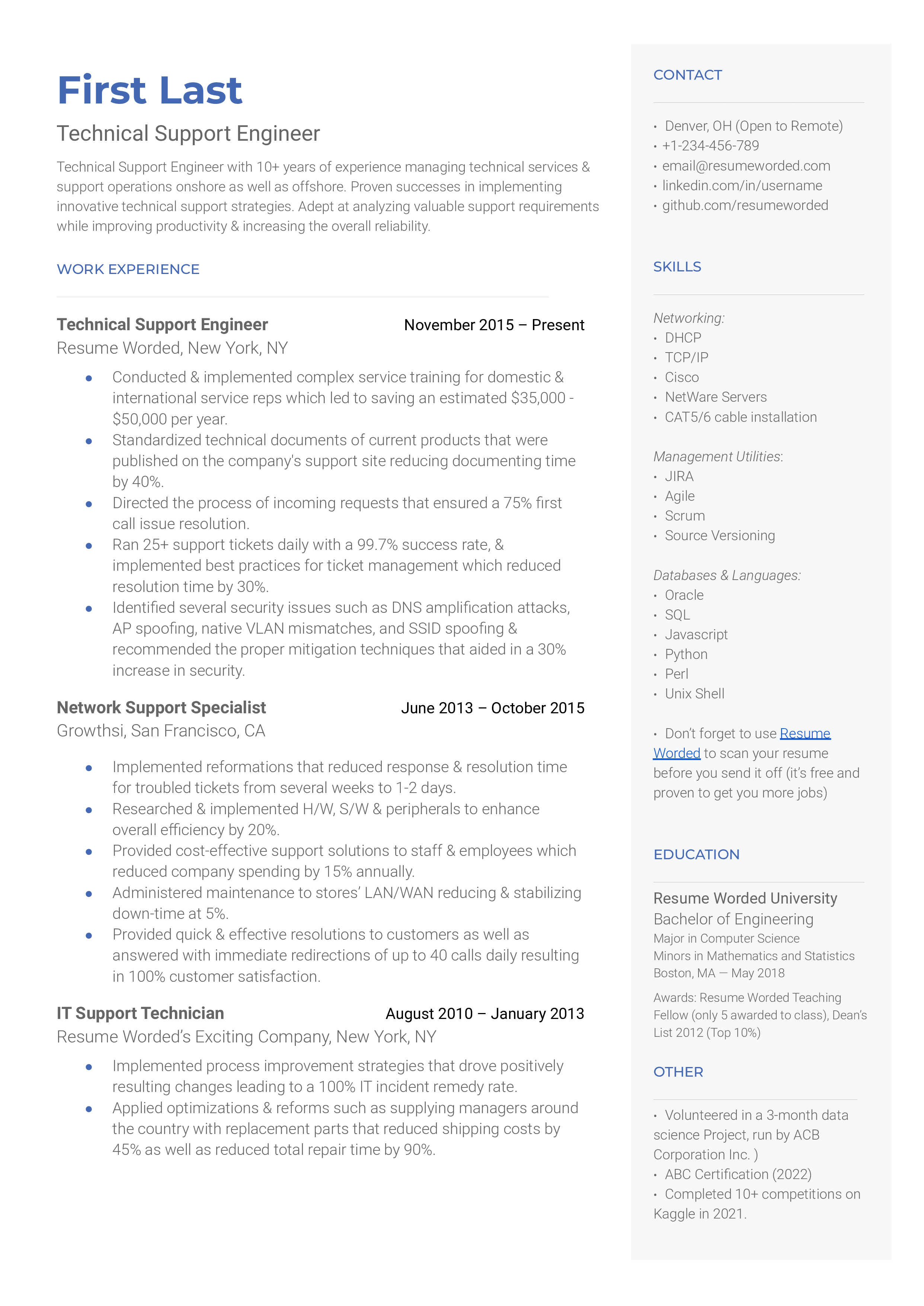Navigating the job market, especially in the fast-paced world of IT, can feel like a complex puzzle. You’ve got the skills, the passion, and the drive to solve technical challenges, but how do you effectively present all that on paper? Your CV isn’t just a document; it’s your personal marketing tool, a concise summary of why you’re the perfect fit for that dream IT support role.
A well-crafted CV doesn’t just list your past jobs; it tells a compelling story of your capabilities and potential. This is especially true for an IT Support Engineer, where practical skills, problem-solving abilities, and customer interaction are paramount. Finding the right structure and content can make all the difference, and that’s exactly what we’ll explore as we delve into creating an impactful it support engineer cv template.
Crafting a Standout IT Support Engineer CV
Your CV is often the first impression a potential employer has of you, so it needs to be impactful and easy to digest. For an IT Support Engineer, it’s crucial to highlight not just your technical prowess but also your ability to communicate complex issues simply, manage user expectations, and solve problems under pressure. Think about the specific requirements of the roles you’re applying for and tailor your content to match their needs, using keywords from their job descriptions to make your application stand out.
Starting with a strong personal statement or summary is vital. This short paragraph, typically 3-5 lines, should immediately convey your most relevant skills, experience, and career aspirations. It’s your elevator pitch, designed to hook the recruiter and encourage them to read on. Highlight your years of experience, key technical areas you excel in, and perhaps a soft skill like exceptional customer service or a knack for rapid troubleshooting.
Key Sections to Include
Beyond the summary, a well-structured IT support engineer CV template will clearly delineate your professional journey and capabilities. The skills section is incredibly important for an IT Support Engineer. This is where you list all your technical competencies, from operating systems (Windows, macOS, Linux) and network protocols (TCP/IP, DNS, DHCP) to hardware troubleshooting, software applications, and ticketing systems (Jira, Zendesk, ServiceNow). Don’t forget to include those essential soft skills, as IT support is as much about people as it is about technology.

- Operating Systems: Windows Server, macOS, Linux distributions
- Networking: TCP/IP, DNS, DHCP, VPNs, Routers, Switches, Firewalls
- Hardware Troubleshooting: Desktops, Laptops, Printers, Servers
- Software Applications: Microsoft 365, Google Workspace, CRM tools, Antivirus
- Ticketing Systems: ServiceNow, Jira Service Desk, Zendesk, ConnectWise
- Problem Solving: Root cause analysis, diagnostic tools, logical troubleshooting
- Customer Service: Excellent communication, empathy, user training
- Security: Basic cybersecurity principles, patch management, threat detection
When detailing your professional experience, go beyond just listing job titles and dates. For each role, use action verbs and quantify your achievements wherever possible. Instead of just saying “fixed computers,” try “Resolved over 50 technical issues daily, reducing average ticket resolution time by 15%.” This demonstrates the impact you had in your previous roles, showing employers not just what you did, but how well you did it and the value you brought to your team or organization.
Tips for Optimising Your IT Support Engineer CV for Success
Once you have the core content, it’s time to refine and optimise your CV for maximum impact. Presentation matters immensely. Ensure your CV has a clean, professional layout that is easy to read. Use a clear, standard font, consistent formatting for headings and bullet points, and ample white space to prevent it from looking cluttered. Remember, recruiters spend only a few seconds initially scanning a CV, so readability is paramount.
Many companies use Applicant Tracking Systems (ATS) to filter applications before a human even sees them. To ensure your CV passes through these digital gatekeepers, strategically incorporate keywords relevant to the IT support role. These are often found in the job description itself. Include variations of technical terms and responsibilities that accurately reflect your experience. Using a professional and widely accepted it support engineer cv template can often help with ATS compatibility, but always double-check against the specific job posting.
Quantifying your achievements is one of the most powerful ways to strengthen your CV. Numbers speak volumes. Think about how you can measure your impact: “Supported over 200 internal users,” “Managed a network of 50+ devices,” “Contributed to a project that improved system uptime by 99.9%.” These metrics provide concrete evidence of your capabilities and demonstrate your value in a way that generic statements cannot. It shows you’re results-oriented and understand the business impact of your technical work.
- Reduced system downtime by X% through proactive maintenance.
- Improved user satisfaction scores by Y points after implementing new support procedures.
- Handled an average of Z tickets per day, consistently meeting or exceeding SLAs.
- Trained P new employees on company software and hardware, enhancing team efficiency.
- Successfully deployed Q new hardware units, on time and within budget.
Finally, always proofread your CV meticulously. A single typo or grammatical error can undermine your professionalism. After you’ve gone over it several times, ask a friend or colleague to review it for any mistakes you might have missed. A fresh pair of eyes can often spot errors that you, having read it repeatedly, might overlook. This small step can make a significant difference in how your application is perceived.
Creating a compelling CV is an art, but with the right approach, you can significantly boost your chances of landing that coveted interview. By focusing on clarity, impact, and tailoring your content to the specific roles you desire, you’re not just listing your history; you’re showcasing your future potential.
Remember, your CV is a dynamic document that should evolve with your career. Keep it updated with new skills, certifications, and achievements. With a strong, well-presented CV, you’ll be well on your way to securing a rewarding role as an IT Support Engineer, ready to tackle new challenges and contribute your expertise.
